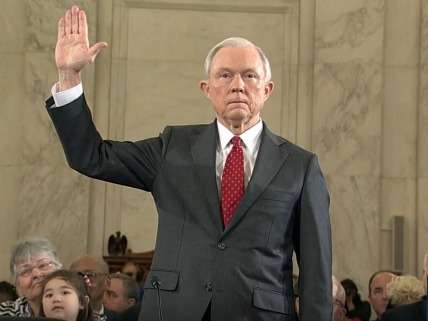Jeff Sessions Provides More Evidence That He Plans a Marijuana Crackdown
The attorney general ties legalization to violence, interstate smuggling, underage consumption, and health hazards.

In comments to reporters yesterday, Attorney General Jeff Sessions provided more reason to worry that a crackdown on state-licensed marijuana businesses is in the offing. "I'm definitely not a fan of expanded use of marijuana," said Sessions, an old-fashioned drug warrior who thinks "good people don't smoke marijuana." While states "can pass the laws they choose," he added, "I would just say it does remain a violation of federal law to distribute marijuana throughout any place in the United States, whether a state legalizes it or not."
Sessions gave little indication of the extent to which he plans to enforce that law, except to say that "we're going to look at it…and try to adopt responsible policies." But he expressed sympathy for states such as Nebraska that complain about an influx of marijuana from states where it is legal and worried about rising potency. "Current levels of THC in marijuana are very high compared to what they were a few years ago, and we're seeing real violence around that," he said. "Experts are telling me there's more violence around marijuana than one would think, and there's big money involved."
While it sounded like Sessions was harking back to Harry Anslinger's "reefer madness" campaign against marijuana by blaming violence on the pharmacological effects of super-potent pot, it seems the attorney general is more worried about the "big money involved" in the marijuana trade. "You can't sue somebody for a drug debt," he said. "The only way to get your money is through strong-arm tactics, and violence tends to follow that."
If Sessions' main concern is the violence that occurs when marijuana suppliers have no legal way to resolve disputes, of course, he should welcome the peace brought by legalization. "By talking about marijuana and violence," observes Marijuana Majority Chairman Tom Angell, "the attorney general is inadvertently articulating the strongest argument that exists for legalization, which is that it allows regulated markets in a way that prohibition does not. The only connection between marijuana and violence is the one that exists when illegal sellers battle it out for profits in the black market."
Assuming that Sessions' plans include "greater enforcement" of the federal ban on marijuana, as White House Press Secretary Sean Spicer suggested last week, it could take several forms. Sessions could easily disavow the Justice Department's policy of prosecutorial forbearance, which was laid out in a 2013 memo from James Cole, then the deputy attorney general. But even without renouncing the Cole memo, Sessions could seriously disrupt or cripple the cannabis industry in states such as Colorado and Washington by taking a broader view of the federal "enforcement priorities" Cole listed.
Those priorities include preventing violence and interstate smuggling, both issues that Sessions raised yesterday. The priorities also include preventing distribution to minors and minimizing "adverse public health consequences related to marijuana use," a potentially unlimited license for federal meddling. Yesterday Sessions also alluded to those rationales for intervention. "Most of you probably know I don't think America is going to be a better place when more people of all ages, and particularly young people, start smoking pot," he said. "I believe it's an unhealthy practice."
During his confirmation hearing last month, Sessions conceded that enforcing the federal ban on marijuana is "a problem of resources for the federal government" and said "some" of Cole's criteria "are truly valuable in evaluating cases." But he added that "the criticism I think that was legitimate is that they may not have been followed." In fact, that was the theme of the April 2016 Senate hearing at which Sessions said "the Department of Justice needs to be clear" that "marijuana is not the kind of thing that ought to be legalized." The title of the hearing, which was held by the Senate Caucus on International Narcotics Control, asked, "Is the Department of Justice Adequately Protecting the Public from the Impact of State Recreational Marijuana Legalization?" Sessions' answer clearly is no.


Show Comments (87)